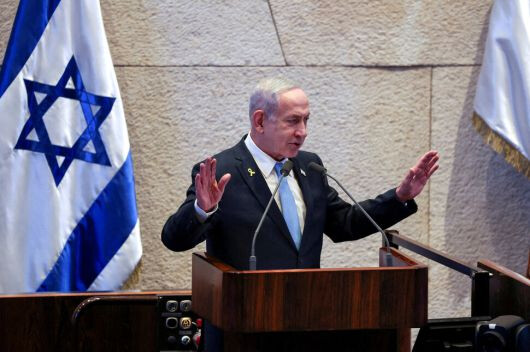
JERUSALEM – Israeli Prime Minister Benjamin Netanyahu declared on Thursday evening, June 19, that Israel's military campaign against Iran is progressing ahead of schedule, signaling readiness for further advancements. In a significant statement reported by the Times of Israel on June 20, Netanyahu asserted that Israel possesses the independent capability to strike all of Iran's nuclear facilities, including the deeply buried Fordow underground nuclear site, without requiring support from the United States.
Netanyahu's remarks underscore heightened tensions between the two regional adversaries. The Fordow Fuel Enrichment Plant, a critical component of Iran's nuclear infrastructure, is situated approximately 100 kilometers southwest of Tehran, near the holy city of Qom. Buried 80 to 100 meters deep beneath a mountain, it is considered Iran's most heavily fortified uranium enrichment facility, designed to withstand aerial assaults. The site houses thousands of centrifuges, enriching uranium to a purity of up to 60%, a level alarmingly close to weapons-grade material. The strategic importance and subterranean nature of Fordow make it a high-value, yet challenging, target, prompting discussions within the U.S. about the potential deployment of specialized "bunker-buster" bombs.
Addressing concerns regarding the purported depletion of Israel's Arrow interceptor missile stockpiles, Netanyahu confirmed that the United States is actively engaged in resupplying these advanced defense systems. He emphasized that Israel's focus is on neutralizing Iranian missile launchers, stating, "It doesn't matter how many rockets Iran has. What matters is how many launchers it possesses, and we have already destroyed more than half of the launchers." This claim follows an earlier statement from the Israeli military indicating the destruction of approximately 40% of Iran's missile launchers. However, some U.S. officials have expressed concerns, suggesting that Israel's Arrow interceptor inventory is indeed running low due to sustained Iranian ballistic missile attacks, potentially leaving Israel with only 10-12 days of defense capacity at the current rate of fire.
The ongoing conflict, reportedly code-named "Operation Rising Lion," commenced on June 13, 2025, with Israel launching widespread airstrikes across Iran. These operations have targeted dozens of military objectives, including facilities for missile manufacturing, various missile storage and launch sites, and the headquarters of an advanced research institute (SPND). In retaliation, Iran has conducted its own missile attacks on Israeli territory, resulting in casualties and damage, including strikes in southern Israel such as Beersheba. Iranian forces have also been compelled to reposition some of their missile launchers further inland to evade Israeli strikes, subsequently placing certain systems out of range for targets within Israel.
The escalating military confrontation has drawn significant international concern. United Nations Secretary-General Antonio Guterres and other global bodies have warned against the rapid escalation, particularly emphasizing the severe risks associated with attacks on nuclear facilities and urging for de-escalation and diplomatic solutions. Despite these calls, both sides continue to exchange strikes, highlighting the volatile nature of the current regional security landscape.
[Copyright (c) Global Economic Times. All Rights Reserved.]




























